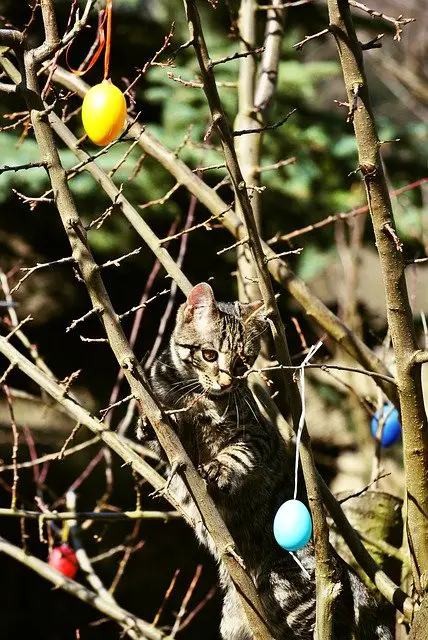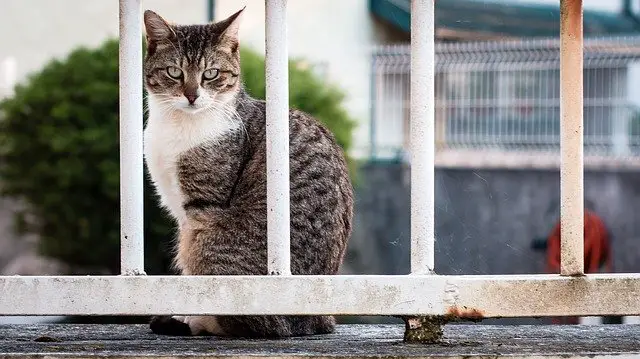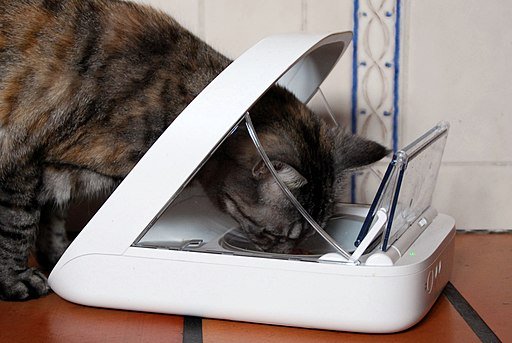Cats are quite well known for enjoying their own space but does this mean they always want to be alone?
Not at all!

Like us, cats can get lonely.
However, this does not mean your cat IS lonely.
Many cats are fine living alone but let’s take a closer look and find out the sings of loneliness and the reasons your cat may be lonely.
Contents
Do Cats Get Lonely?
Although cats like to hunt and eat on their own they do have social needs that need to be met.
It can be easy to presume that cats want to be on their own and are happy with this, especially when you see them avoiding or fighting with others but the reality is that cats have complex social behaviors and needs.
More often than not feral cats form colonies and most of the time pet cats are happy to befriend each other too.
However, the territorial nature of adult cats can cause problems when trying to find a suitable friend for your cat.
Are Kittens More Sociable?
Kittens are definitely more sociable than adult cats, they crave company and often bond closely to littermates.
It is likely that kittens who are introduced, even from different litters, will bond and become good friends.

It is during this infancy stage where kittens develop their social skills and benefit heavily from play and interaction.
However, it is important to remember that every cat has its own personality and some cats (even when they are young) simply prefer to be alone so take this into account when determining how your cat is coping with living alone.
Signs Your Cat Could Be Lonely

If you are concerned that your cat could be lonely, keep an eye out for the following signs:
NOTE: any changes in habit and behavior could be a sign of a medical problem so be sure to speak to a veterinarian to rule out medical issues first.
- Clinginess: If you notice an increase in how needy your cat is, for example your cat is following you around or constantly demanding attention, this may be a sign that they are feeling lonely.
- Uncharacteristic aggression: Seeing displays of uncharacteristic aggression and destructive behaviour from your cat could be an indication of loneliness.
- Urinating on your belongings: If your cat is urinating on anything that has your scent on this could be a disapproving behavior showing they do not like to be left alone.
- Change in grooming habits: grooming excessively and pulling out fur is a sign that your cat is unhappy which could be linked to loneliness. Equally, not grooming enough could also be a sign of loneliness too.
- Change in eating habits: a change in the speed and amount of food your cat is eating could be an indication that they are bored, lonely or depressed.
- A change in energy levels: if your cat is lethargic or has become low in energy it could be because they are becoming lonely, bored or depressed.
As these signs can also be indicative of a health problem, it is important to take your cat to the vet to ensure there are no underlying health issues. If there are no health problems then your cat is most likely lonely and will benefit from a friend.
Other Possible Reasons for Increased Stress and Anxiety
There are other possible reasons that your cat is displaying behaviours that indicate stress or anxiety.
This includes changes to their usual routine.

Changes to your cat’s usual routine can have a big impact on how your cat is feeling. They are creatures of habit and are highly attuned to the consistent activities that take place each day, if there is a sudden change in this routine then your cat may feel out of place.
This also comes hand in hand with suddenly leaving your cat for long periods of time.
How Can I Find a Suitable Friend for My Cat?
First of all, it is really important you get to know your cat and what your cat needs.
This may involve finding out how your cat was raised in terms of social circumstances, equally you should have a good idea of this for the new cat too.
By knowing about each cat, you can try to determine whether they will be a good match.
Of course, if both cats were raised with other cats and are generally playful with other cats then there is a higher chance of a successful introduction.
Try to find a cat that is of a similar age and energy level to yours too.
How Should You Introduce Them?
If you’ve found a new cat that you consider to be a suitable potential friend for your cat then the next step is introducing them. As cats can be very territorial it is vital you take precautions when introducing them.
You should first give both cats a chance to get used to the sounds and smells of each other before they actually meet as this gives them time to adapt and reduces the likelihood of the cats being stressed when they meet.
It is very important that each cat has its own food bowl and area to eat in as cats like to be solitary when they eat.
It is also important to reinforce positive experiences throughout the introduction, this can be done by offering treats to them both.
I Need to Leave My Cat for The Day – How Can I Avoid Unnecessary Stress?
If you need to leave your cat at home for a short period of time, there are a couple of things you can do to make the situation less stressful for your cat. You can:
Provide stimulation to keep your cat busy: making sure your cat has access to scratching posts and toys can help keep them distracted while you’re away.
Sometimes leaving the radio on low in the background can help your cat to feel less alone too. Some cats will also watch TV if you put something that stimulates their prey drive on which can help them forget that they are alone altogether.
Ensure they have enough food, water, and the litter tray is clean.
Your cat should be fine if left alone for a short amount of time but if you are going to be away for longer then it is important to plan ahead and make sure your cat is looked after and has everything they need.
I Have One Cat Which Doesn’t Seem to Be Lonely
Just like us, cats are individuals and some will be more social than others.

Some cats will be content with spending time alone and just socializing with you when you’re at home. Others will thrive with a feline companion. It completely depends on the personality of your cat.
Ultimately, you will know your cat best and you should be able to determine if your cat is happy and stimulated.
It is important not to ignore behavioural changes and keep in mind the possibility of loneliness should any changes occur.
Loneliness in Cats – Summary
To summarize, cats can feel lonely and loneliness can have a noticeable impact on their day to day lives.
If you notice that your cat seems to be showing the signs we discussed above and you feel it could be down to loneliness then you can help by spending more time with your cat or carefully choosing and introducing a companion.
Adult cats can be territorial so do not rush the process and make sure the cats are familiar to each other’s smell before actually introducing them.
Once the cats have bonded they will be able to keep each other company.
References:
https://www.petmd.com/cat/slideshows/7-signs-your-cat-may-need-feline-companion
http://www.vetstreet.com/our-pet-experts/how-long-can-i-leave-my-cat-home-alone
https://icatcare.org/advice/how-guides/how-introduce-new-adult-cat-your-cathttps://www.pdsa.org.uk/media/3291/pdsa-paw-report-2017_printable-1.pdf
As an Amazon Associate I may earn a small fee from qualifying purchases at no extra cost to you. This helps us run the site, so thanks for your support!






Leave a Comment